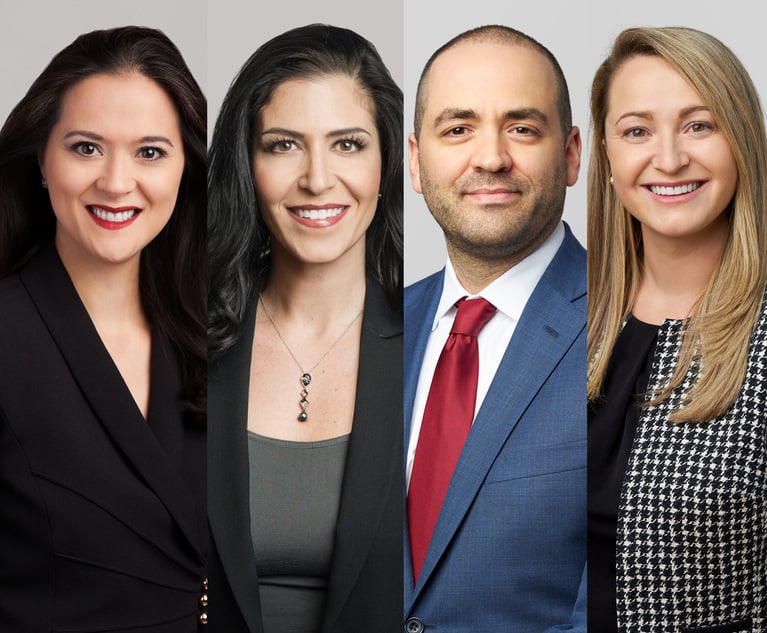Four J&J Talc Cases Moving to Trial
Johnson & Johnson has had mixed success around the country in court fights with plaintiffs who say that using the company's baby powder caused cancer.
January 08, 2019 at 01:30 PM
5 minute read
The original version of this story was published on New York Law Journal
 Photo: Shutterstock.com
Photo: Shutterstock.com
Four talcum powder suits against Johnson & Johnson are set to proceed this month to trial in the New York City Asbestos Litigation court, where plaintiffs attorneys may be able to wield a formidable weapon in the threat of punitive damages, a remedy that had been unavailable for more than two decades, but to which the door was opened last year.
Johnson & Johnson has had mixed success around the country in court fights with plaintiffs who say that using the company's baby powder caused cancer.
In April, a New Jersey jury awarded $117 million for a plaintiff, of which $80 million was punitive damages. But several months later, the jury in another talc-powder case found for the defense after a half-hour of deliberations.
Though the company and its attorneys may have their work cut out for them defending themselves in the asbestos court in Manhattan, known as the NYCAL court.
The court is routinely criticized by groups like the American Tort Reform Foundation, which casts the court as plaintiff-friendly and routinely includes it on its annual “judicial hellholes” list.
Another group, the Lawsuit Reform Alliance of New York, seized on a recent leadership change at the NYCAL court to portray the court as chaotic. Manhattan Supreme Court Justice Lucy Billings became the court's coordinating justice last year after Justice Peter Moulton was elevated to the Appellate Division, First Department.
But after six months on the job, Billings was reassigned and Manhattan Supreme Court Justice Manuel Mendez was named coordinating justice.
Mendez presides over talc-powder cases that are moving forward to trial this month in the NYCAL court, where plaintiffs often win multimillion-dollar payouts—just weeks after The New York Times and Reuters published exposes detailing memos sent between Johnson & Johnson executives in which they expressed concerns that the company's baby powder contains asbestos.
“We look forward to the opportunity of presenting the documents and the inside story to juries in New York City,” said Jerome Block, a partner at Levy Konigsberg who represents plaintiffs with cases going to trial in the asbestos court.
In the trials, Block and other Levy Konigsberg attorneys will face off with Thomas Kurland and John Winter of Patterson Belknap Webb & Tyler.
Around the time that the Times and Reuters ran their stories, Johnson & Johnson reportedly reached a $1.5 million settlement with a Suffolk County woman who alleged that she got mesothelioma from using Johnson & Johnson baby powder.
Johnson & Johnson has maintained that its baby powder is safe and asbestos-free and reports of its settlement with Ann Zoas, the Suffolk County plaintiff, should not be viewed as an indication that that position has changed, according to a statement forwarded by a spokeswoman.
“We do not have any organized program to settle Johnson's baby powder cases, nor are we planning a settlement program,” the statement reads. “Rather, we will continue to vigorously defend the safety of Johnson's baby powder in the courtroom.”
Additionally, the trials are beginning several months after the New York Court of Appeals declined to hear arguments in a challenge by the asbestos defense bar against a new case management order for the NYCAL court allowing plaintiffs to move for punitive damages.
There have already been signs that plaintiffs could fare well in efforts to pursue punitive damages.
In one of the cases set to go to trial, Delaware resident Donna Olson, 65, alleges that her use of Johnson & Johnson baby powder and its Shower to Shower product caused her to develop mesothelioma, Mendez denied summary judgment for Johnson & Johnson, upholding Olson's motion for summary judgment.
The purpose of punitive damages is to punish defendants for “wanton, reckless or malicious” acts and to prevent defendants from acting that way in the future, Mendez said.
Because the plaintiffs argue that Johnson & Johnson put “corporate profits and reputation over the health and safety of consumers,” the judge said, it should be left to a jury to decide punitive damages are warranted.
Punitive damages were taken off the table for asbestos plaintiffs in the NYCAL court in 1996, when then-Manhattan Supreme Court Justice Helen Freedman, the court's first coordinating justice, deferred all punitive damages claims, a move tantamount to dismissal.
Freedman later explained in an article for the Southwestern University Law Review that there is “no corrective purpose” in hitting companies with punitive damages for wrongs allegedly committed decades ago, oftentimes by predecessor companies, and that punitive damages deplete monies that could otherwise be used to make plaintiffs whole.
But in 2014, Manhattan Supreme Court Justice Sherry Klein Heitler issued an order that lifted the blockade on punitive damages, touching off a legal clash between the asbestos plaintiffs and defense bars.
This content has been archived. It is available through our partners, LexisNexis® and Bloomberg Law.
To view this content, please continue to their sites.
Not a Lexis Subscriber?
Subscribe Now
Not a Bloomberg Law Subscriber?
Subscribe Now
NOT FOR REPRINT
© 2025 ALM Global, LLC, All Rights Reserved. Request academic re-use from www.copyright.com. All other uses, submit a request to [email protected]. For more information visit Asset & Logo Licensing.
You Might Like
View All
On the Move and After Hours: Einhorn Barbarito; Gibbons; Greenbaum Rowe; Pro Bono Partnership
4 minute read

Engine Manufacturer Escapes Suit Over NJ Helicopter Crash That Killed Country Music Star
3 minute readTrending Stories
- 1ACC CLO Survey Waves Warning Flags for Boards
- 2States Accuse Trump of Thwarting Court's Funding Restoration Order
- 3Microsoft Becomes Latest Tech Company to Face Claims of Stealing Marketing Commissions From Influencers
- 4Coral Gables Attorney Busted for Stalking Lawyer
- 5Trump's DOJ Delays Releasing Jan. 6 FBI Agents List Under Consent Order
Who Got The Work
J. Brugh Lower of Gibbons has entered an appearance for industrial equipment supplier Devco Corporation in a pending trademark infringement lawsuit. The suit, accusing the defendant of selling knock-off Graco products, was filed Dec. 18 in New Jersey District Court by Rivkin Radler on behalf of Graco Inc. and Graco Minnesota. The case, assigned to U.S. District Judge Zahid N. Quraishi, is 3:24-cv-11294, Graco Inc. et al v. Devco Corporation.
Who Got The Work
Rebecca Maller-Stein and Kent A. Yalowitz of Arnold & Porter Kaye Scholer have entered their appearances for Hanaco Venture Capital and its executives, Lior Prosor and David Frankel, in a pending securities lawsuit. The action, filed on Dec. 24 in New York Southern District Court by Zell, Aron & Co. on behalf of Goldeneye Advisors, accuses the defendants of negligently and fraudulently managing the plaintiff's $1 million investment. The case, assigned to U.S. District Judge Vernon S. Broderick, is 1:24-cv-09918, Goldeneye Advisors, LLC v. Hanaco Venture Capital, Ltd. et al.
Who Got The Work
Attorneys from A&O Shearman has stepped in as defense counsel for Toronto-Dominion Bank and other defendants in a pending securities class action. The suit, filed Dec. 11 in New York Southern District Court by Bleichmar Fonti & Auld, accuses the defendants of concealing the bank's 'pervasive' deficiencies in regards to its compliance with the Bank Secrecy Act and the quality of its anti-money laundering controls. The case, assigned to U.S. District Judge Arun Subramanian, is 1:24-cv-09445, Gonzalez v. The Toronto-Dominion Bank et al.
Who Got The Work
Crown Castle International, a Pennsylvania company providing shared communications infrastructure, has turned to Luke D. Wolf of Gordon Rees Scully Mansukhani to fend off a pending breach-of-contract lawsuit. The court action, filed Nov. 25 in Michigan Eastern District Court by Hooper Hathaway PC on behalf of The Town Residences LLC, accuses Crown Castle of failing to transfer approximately $30,000 in utility payments from T-Mobile in breach of a roof-top lease and assignment agreement. The case, assigned to U.S. District Judge Susan K. Declercq, is 2:24-cv-13131, The Town Residences LLC v. T-Mobile US, Inc. et al.
Who Got The Work
Wilfred P. Coronato and Daniel M. Schwartz of McCarter & English have stepped in as defense counsel to Electrolux Home Products Inc. in a pending product liability lawsuit. The court action, filed Nov. 26 in New York Eastern District Court by Poulos Lopiccolo PC and Nagel Rice LLP on behalf of David Stern, alleges that the defendant's refrigerators’ drawers and shelving repeatedly break and fall apart within months after purchase. The case, assigned to U.S. District Judge Joan M. Azrack, is 2:24-cv-08204, Stern v. Electrolux Home Products, Inc.
Featured Firms
Law Offices of Gary Martin Hays & Associates, P.C.
(470) 294-1674
Law Offices of Mark E. Salomone
(857) 444-6468
Smith & Hassler
(713) 739-1250







